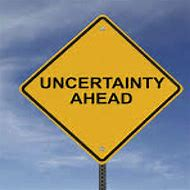Hi, this is Bonnie with Clearmont Technologies. I recently chatted with some of our hiring managers and found something they said to be unexpected and interesting. I asked them, what helps you differentiate among qualified candidates? They said the things you would normally expect, such as what skills and experiences a person has. Then they said something that was surprising. They said, they’re looking for people who are comfortable with uncertainty or ambiguity.
This was shocking! I decided to do a little research and figure out if this was something you’re just naturally born with, or is it something that could be a learnable skill? So, I did what anybody would do. I googled it. Before I get into a few tips on how you can develop this learnable skill, I’d like to share a quote from Eckhart Tolle. He said, “When you become comfortable with uncertainty, infinite possibilities open up in your life.”
 Try new and low-risk experiences
Try new and low-risk experiences
With that, let me get into some of the tips for developing this skill. One is to try out new and low-risk experiences. What would be an example of this? If you always go to the same restaurant, eat something new. Maybe order a different dish than you normally do. I go to the same restaurant, and I order the same thing every time. In fact, the waiter says before I order, “Bonnie, I know you’re having shrimp francese and you want the francese sauce on the pasta.” This is definitely an indication that I need to branch out a little bit more into uncertainty and try something new.
Another low-risk experience to try is to change where you go on vacation. If you usually go on a trip to Asia, try Europe instead. If you always go to Florida, try Arizona. If this seems like too big of a step and you need to take a baby-step, change up something about your clothes. I noticed that I wear a lot of the same colors and same clothes all the time. Add in a few new pieces or colors. The idea is that modest changes can build your tolerance for uncertainty, so that when bigger things happen, you’ll be better equipped to handle them.
Accept that you can’t predict the future
You may want to create a life with standard routines believing that this can help you control the future. However, a restricted daily life may not allow for wonderful surprises. By recognizing that no one can anticipate the future, you can open yourself to the magic of unpredictability and hidden opportunity.
C. Joybell says, “I have come to accept the feeling of not knowing where I am going. And I have trained myself to love it. Because it is only when we are suspended in mid-air with no landing in sight, that we force our wings to unravel and alas begin our flight. And as we fly, we still may not know where we are going to. But the miracle is in the unfolding of the wings. You may not know where you’re going, but you know that so long as you spread your wings, the winds will carry you.”
I hope some of these tips not only help you in your own life, but also in getting hired for a new and exciting job!
